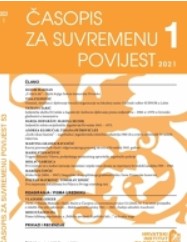Prvi svjetski rat u kulturi sjećanja: inozemne i srpske ratne drame na repertoaru hrvatskih kazališta 1919. – 1941.
World War I in the Culture of Memory: Foreign and Serbian War Dramas on the Repertoires of Croatian Theatres 1919–1941
Author(s): Mislav GabelicaSubject(s): Theatre, Dance, Performing Arts, Cultural history, Pre-WW I & WW I (1900 -1919), Interwar Period (1920 - 1939), History of Art
Published by: Hrvatski institut za povijest
Keywords: World War I; theatre; war drama; Croatian public;
Summary/Abstract: In this paper, the author approaches Croatian theatres as places of memory, and the foreign and Serbian war dramas performed in them as the contents of the Croatian culture of memory regarding World War I. Drawing upon the extant research on Croatian memory of World War I, based on examining the Croatian literary heritage, according to which the predominant Croatian memory was presented in Miroslav Krleža’s war cycle, the author has attempted to answer the question, how did these non-Croatian war dramas on the repertoire of Croatian theatres correspond to the stated Croatian relationship towards World War I according to their contents, frequency of performance, and public reactions to them (as seen through theatre reviews)? In this sense, the author has identified three groups of non-Croatian war dramas: British (American) and French, which were characterised by prominent pacifism; Czechoslovak, which were anti-Austrian and contained a note of Czech nationalism; and Serbian, which nurtured the Serbian victory culture, but also criticised post-war Serbian society. Analysing these dramas, the author has concluded that Serbian war dramas enjoyed the strongest ‘institutional support’, but were also the least popular with the Croatian public. Czechoslovak war dramas received the least ‘institutional support’, but were the most popular among the Croatian public. Based on this analysis, the author has concluded that the Czechoslovak dramas had the most in common with the predominant Croatian memory of World War I in the interwar period; even though they did not receive much ‘institutional support’, they were the closest to the Croatian memory of the war in the given circumstances.
Journal: Časopis za suvremenu povijest
- Issue Year: 53/2021
- Issue No: 1
- Page Range: 221-249
- Page Count: 29
- Language: Croatian

